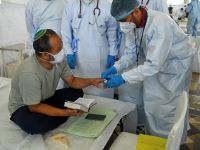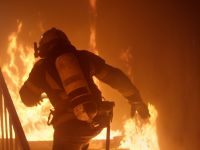Suspected Islamic rebels have killed 23 civilians in western Algeria hours before a parliamentary election began on Thursday in this North African country, the official Algerian news agency APS said.
The victims were all nomad people killed overnight in Sendjas village in Chlef province, about 170 kms west of Algiers, APS reported, quoting a government security source. The bodies of three of the murdered nomads were set ablaze, added APS. The massacre was the latest in a series of killings of civilians and members of government forces in the past few weeks.
In other incidents, militants killed a member of Algeria’s security forces and a hitchhiker Wednesday in two separate attacks in the east of the country, officials said.
The head of a local guard unit at Toualbia was shot dead and a member of the same unit wounded when they were ambushed in their car near Jijel, some 350 kilometers east of Algiers, according to AFP. The hitchhiker died on the same road early Wednesday.
Poll
Thursday’s poll is the second legislative election since a bloody uprising flared after the cancellation of a parliamentary poll in 1992 in which radical Islamists had taken a commanding lead. The last elections in 1997 gave Algeria its first multiparty assembly but were themselves tarnished by allegations of fraud.
On Thursday, Algerians are choosing legislators in a vote seen as vital to its search for real stability. But soaring unemployment, crammed housing and severe water shortages have turned many voters away from the election — whose results they claim have already been decided. President Abdelaziz Bouteflika, however, has vowed the elections will be free and warned against attempts to undermine them.
The dissatisfaction has been abetted by boycott calls from the country's sizable Berber minority. Two leading opposition parties, both pro-Berber, the Socialist Forces' Front and the Rally for Culture and Democracy, have called for a boycott of Thursday's vote.
The Berbers — who claim to be North Africa's original inhabitants — want their language to be officially recognized by the government and demand an end to what they say is systematic discrimination by the Arab majority.
Berbers make up about a third of the population in Algeria. While most do not live in the Berber region of Kabyle, east of Algiers, a boycott there could weigh on the abstention rate.
Opponents project the main partners in Algeria's coalition government, like the National Liberation Front of Prime Minister Ali Benflis and the National Democratic Rally, will retain control this time around.
A critical gauge of the success of the vote could be the abstention rate. A poll published recently in the daily El Watan predicted it would be less than 40 percent. (Albawaba.com)
© 2002 Al Bawaba (www.albawaba.com)







